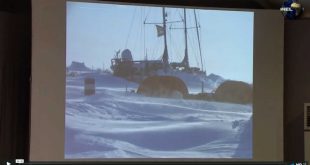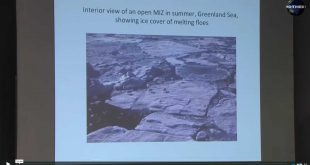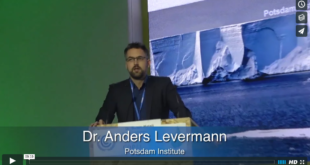In an exclusive interview with Mother Channel, Professor Peter Wadhams leading Arctic scientist and Prof. of Ocean Physics at Cambridge University, talks on catastrophic outcomes in terms of Retreating and Thinning Sea Ice, Methane in Oceans and on Land, Carbon Emissions, Food shortages, Resources and global Refugee crisis at COP 22, Marrakech.
In the period since COP 21, I have returned to the Arctic twice since then, my latest field trip being to measure waves in ice at the Barents Sea, in a region east of Svalbard, a Norwegian archipelago between mainland Norway and the North Pole, where normally the winter ice would be about 1.5m thick, but instead was found to be only 40cm thick, very much thinner, and the actual ice sheet was bending under the wave motion, this being one of the regions where the winter ice is retreating and thinning and it should have been at its maximum thickness. Also of note, in the autumn of 2016 we did a field trip into the southern most part of the Beaufort Sea (Canada’s western Arctic stretches across the northern coasts of the Northwest Territories and Yukon, and into Alaska), when the ice is advancing (winter freeze up season), however, due to there being so much open water around the edge of the Arctic ice cover, the ice was not advancing, due to accumulated heated water by solar radiation (see : http://www.srmgi.org/what-is-srm/) and storm waves bringing up heat from ocean depths causing ice retreat. The end result was a much slower advance of the ice than it had been in previous years, with the ice extent in Arctic being the lowest in the 2015-2016 winter. These long term trends of retreat and thinning are being observed everywhere and we see nothing to stop that trend continuing until all the ice in regions like these disappears totally!
In terms of talking ‘methane’, there’s a difference between halting it and removing it! There have been big ideas concerning methane removal before being emitted naturally to the atmosphere, mostly oil drilling techniques in the form of shallow oil drilling, which would require a large network of wells in shallow water located mainly in the territorial waters of Russia, i.e. East Siberian Sea, Barents Sea, Kara Sea and Laptop Sea, with permissions being required from Russia to carry out any type of drilling process, which is highly unlikely considering Russia’s stand and lack of interest in Climate Change.
The only feasible method with any possibility of working, a geo-engineering technique that has been identified in recent years, called ‘Marine Cloud Brightening’, see : https://www.sciencedaily.com/releases/2014/12/141215203029.htm, where low lying clouds are injected with water vapour (particles) which makes them much brighter causing more radiation to be reflected, in turn causing a targeted cooling effect on the climate. Climate modelling studies have shown that there are three regions in the Northern hemisphere, where if this technique were applied in a focused and simultaneous manner, the effect will zero in on the Arctic thereby cooling the region in preference to other parts of the world, causing the Ice age to advance, once again.
Methane is responsible for approximately a quarter of global warming at the moment, an important factor, however, the big methane problem would be an Arctic emission!
In global terms, everything is changing exponentially, and in a finite world, you cannot have everything growing or changing exponentially indefinitely, everything would come to a grinding halt. At the moment, all the elements are in place for a catastrophic outcome, because we have rapid population growth beyond the capacity of the earth to support it, a threat to food supplies from climate change which in turn is threatening the existing level of food production, let alone increased production to handle increased populations (Population – Food Crisis), including a resource crisis in terms of oil reserves, lithium, etc which will not last indefinitely.
With sea levels rising inexorably, which will continue rising, partly in response to previous warming periods, the current risings are attributed mainly from melting of the ice from the glaciers, causing many more floods in low lying sensitive areas, like Bangladesh and China, but also disasters to low-lying cities, e.g. Miami, having a huge economic ‘knock-on’ effect because its been calculated that that in itself could bring the “Economy of the West to its Knees”, due to loss of vast wealth tied up in coastal real estate, which would plummet to Zero!
If one were to sum up all the negative impacts, which are getting worse at an increased rate, there is not anything compensating in the way of stabilizing effects – everything is destabilizing in an accelerated manner.
“We are facing tremendous threats collectively all moving towards catastrophe for this Planet and Life itself” !
Links :
https://en.wikipedia.org/wiki/Marinecloudbrightening
https://www.nasa.gov/image-feature/early-ice-breakup-of-beaufort-sea-due-to-early-warm-temperatures
https://www.carbonbrief.org/arctic-sea-ice-summer-minimum-2016
http://arcticjournal.com/climate/2604/farewell-ice (Book Review of Farewell to Ice)
Further viewing :
http://www.motherchannel.com/our-time-is-running-out-the-arctic-sea-ice-is-going/
http://www.motherchannel.com/cop-20-lima-arctic-methane-emissions/ (Arctic Methane Emissions and the global warming)





Given that we have been in a mini Ice Age according to data available, as we return to more normal temperatures it would not be surprising to see a change in Arctic Ice mass. Will the rise in temperature continue beyond past normal levels is yet to be seen. The short view is a good focus to nurture alarm . . . The longer view of graphed temperatures back even to the thirteenth century seems less alarming and suggests we are getting back to something one might call more normal . . . if there really is a climate normal.
One can read in history the effect of the cooling period that brought on the “mini ice age” and it’s effects on life in Greenland, and the difficulties of maintaining supply lines even to Iceland. Not sure of the causes but change does keep happening to climate.
Now smog over our cities, and water polluted so that it cannot sustain life . . . these issues seem more identifiable and in our human scope to manage. And I keep wondering if our social environment will not bear far more serious impact on human life in the next few generations than the impact of climate environment. If people loose the ability to function in community, there is no gracious way to do anything and life itself will lose all value. When that happens life itself becomes disposeable . . . And you have the ground laid for violence against human life that makes climate look pretty small.
Gooday Dan,
Thank you for taking the time to comment on our website post : Catastrophic Outcomes, with some interesting points you have raised.
I am not suitably qualified in this arena to respond accurately or scientifically to your assertions, however, would venture to state that in my opinion, the global human social environment and impact of climate environment in next 20-30 years, if not less, are inextricably linked from the point of view that mankind’s technologies and methodologies, e.g. farming, industry, fishing, transport, etc. including scant regard and respect for nature in all her forms over the centuries are definitely a major contributor to the current situation that the planet (earth) finds itself in.
Notwithstanding the fact that climate in all its forms on earth is normally self-regulating, we (mankind) have pushed her to the extreme limits through pollution, land reclamation, habitat destruction for food production and housing, poisoning of ecosystems via chemicals, industry pollutants, etc. and her capacity for rebound and recovery are greatly diminished, and unless we (mankind) are willing to ‘step up to the plate’ and be accountable for our actions, present and past, put our prejudices of each other aside and come together as one nation on this earth, we will be leaving a desecrated, desolate and arid world to the children of the future.
Should you wish to obtain a more considered and scientific opinion on the subject of discussion, I will gladly contact Professor Peter Wadhams and forward on your comment for his perusal and response, however, he has just recently launched his latest book, Farewell to Ice, and will likely be inundated with responding to emails, etc. however, am sure he would be appreciative of feedback and opinion on the subject.
Please advise accordingly,
Jenni
Media Dept – Mother Channel
Contact: media@motherchannel.com